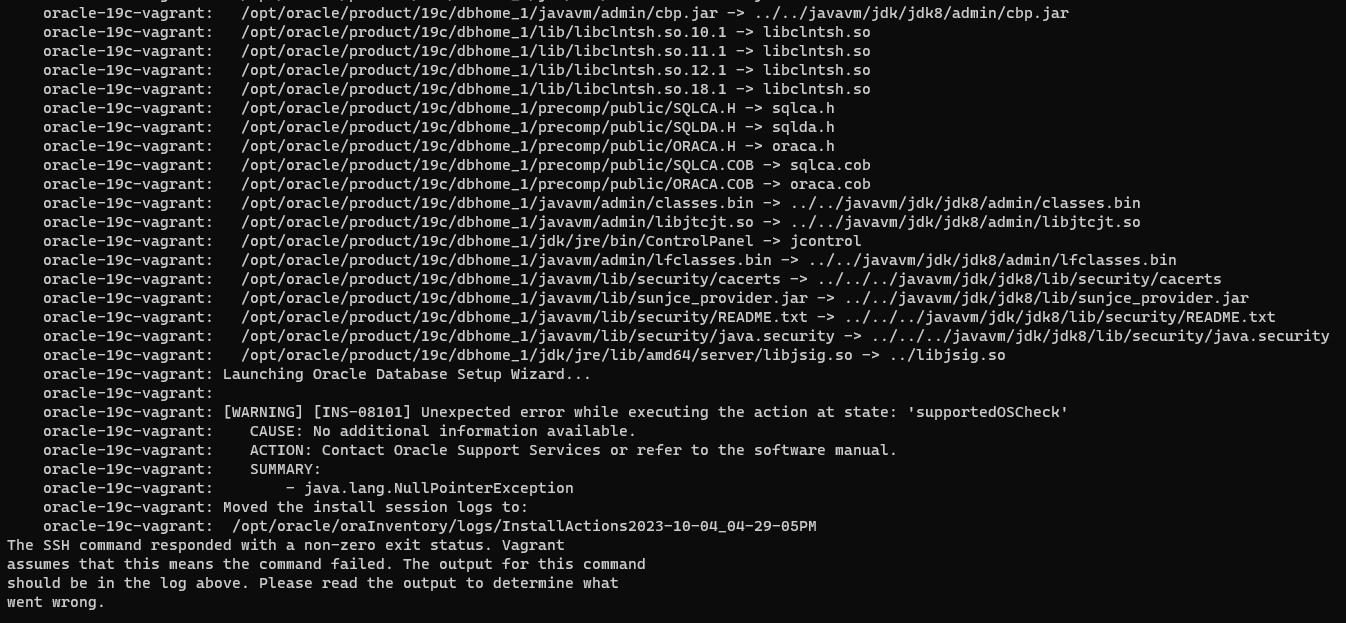Hi,
I am trying to test oracle database VM on my home computer. I am getting the following error:

Here is my setup information:
Host machine OS: running Windows 11 64 bit / home edition
Oracle Virtual Box version: 7.0.10
vagrant version: 2.3.7_windows_amd64
VM machine OS: Oracle Linux 8
https://yum.oracle.com/boxes/oraclelinux/ol8/OL8U8_x86_64-vagrant-virtualbox-b485.box
Oracle database version: 19c
https://download.oracle.com/otn/linux/oracle19c/190000/LINUX.X64_193000_db_home.zip?AuthParam=1696291219_0a5ac89b6466133fe92ff4eac5ae70b4
vagrantfile content:
#
# LICENSE UPL 1.0
#
# Copyright (c) 2018, 2020 Oracle and/or its affiliates.
#
# Since: July, 2018
# Author: gerald.venzl@oracle.com
# Description: Creates an Oracle database Vagrant virtual machine.
# Optional plugins:
# vagrant-env (use .env files for configuration)
# vagrant-proxyconf (if you don't have direct access to the Internet)
# see https://github.com/tmatilai/vagrant-proxyconf for configuration
#
# DO NOT ALTER OR REMOVE COPYRIGHT NOTICES OR THIS HEADER.
#
# -*- mode: ruby -*-
# vi: set ft=ruby :
# Vagrantfile API/syntax version. Don't touch unless you know what you're doing!
VAGRANTFILE_API_VERSION = "2"
# Box metadata location and box name
BOX_URL = "OL8U8_x86_64-vagrant-virtualbox-b485.box"
BOX_NAME = "oraclelinux/8"
# UI object for printing information
ui = Vagrant::UI::Prefixed.new(Vagrant::UI::Colored.new, "vagrant")
# Define constants
Vagrant.configure(VAGRANTFILE_API_VERSION) do |config|
# Use vagrant-env plugin if available
if Vagrant.has_plugin?("vagrant-env")
config.env.load(".env.local", ".env") # enable the plugin
end
# VM name
VM_NAME = default_s('VM_NAME', 'oracle-19c-vagrant')
# Memory for the VM (in MB, 2300 MB is ~2.25 GB)
VM_MEMORY = default_i('VM_MEMORY', 4096)
# VM time zone
# If not specified, will be set to match host time zone (if possible)
VM_SYSTEM_TIMEZONE = default_s('VM_SYSTEM_TIMEZONE', host_tz)
# Oracle base directory
VM_ORACLE_BASE = default_s('VM_ORACLE_BASE', '/opt/oracle')
# Oracle home directory
VM_ORACLE_HOME = default_s('VM_ORACLE_HOME', '/opt/oracle/product/19c/dbhome_1')
# Oracle SID
VM_ORACLE_SID = default_s('VM_ORACLE_SID', 'ORCLCDB')
# PDB name
VM_ORACLE_PDB = default_s('VM_ORACLE_PDB', 'ORCLPDB1')
# Database character set
VM_ORACLE_CHARACTERSET = default_s('VM_ORACLE_CHARACTERSET', 'AL32UTF8')
# Oracle Database edition
# Valid values are 'EE' for Enterprise Edition or 'SE2' for Standard Edition 2
VM_ORACLE_EDITION = default_s('VM_ORACLE_EDITION', 'EE')
# Listener port
VM_LISTENER_PORT = default_i('VM_LISTENER_PORT', 1521)
# EM Express port
VM_EM_EXPRESS_PORT = default_i('VM_EM_EXPRESS_PORT', 5500)
# Oracle Database password for SYS, SYSTEM and PDBADMIN accounts
# If left blank, the password will be generated automatically
VM_ORACLE_PWD = default_s('VM_ORACLE_PWD', '')
end
# Convenience methods
def default_s(key, default)
ENV[key] && ! ENV[key].empty? ? ENV[key] : default
end
def default_i(key, default)
default_s(key, default).to_i
end
def host_tz
# get host time zone for setting VM time zone
# if host time zone isn't an integer hour offset from GMT, fall back to UTC
offset_sec = Time.now.gmt_offset
if (offset_sec % (60 * 60)) == 0
offset_hr = ((offset_sec / 60) / 60)
timezone_suffix = offset_hr >= 0 ? "-#{offset_hr.to_s}" : "+#{(-offset_hr).to_s}"
'Etc/GMT' + timezone_suffix
else
'UTC'
end
end
Vagrant.configure(VAGRANTFILE_API_VERSION) do |config|
config.vm.box = BOX_NAME
config.vm.box_url = BOX_URL
config.vm.define VM_NAME
# Provider-specific configuration
config.vm.provider "virtualbox" do |v|
v.memory = VM_MEMORY
v.name = VM_NAME
end
config.vm.provider :libvirt do |v|
v.memory = VM_MEMORY
end
# add proxy configuration from host env - optional
if Vagrant.has_plugin?("vagrant-proxyconf")
ui.info "Getting Proxy Configuration from Host..."
has_proxy = false
["http_proxy", "HTTP_PROXY"].each do |proxy_var|
if proxy = ENV[proxy_var]
ui.info "HTTP proxy: " + proxy
config.proxy.http = proxy
has_proxy = true
break
end
end
["https_proxy", "HTTPS_PROXY"].each do |proxy_var|
if proxy = ENV[proxy_var]
ui.info "HTTPS proxy: " + proxy
config.proxy.https = proxy
has_proxy = true
break
end
end
if has_proxy
# Only consider no_proxy if we have proxies defined.
no_proxy = ""
["no_proxy", "NO_PROXY"].each do |proxy_var|
if ENV[proxy_var]
no_proxy = ENV[proxy_var]
ui.info "No proxy: " + no_proxy
no_proxy += ","
break
end
end
config.proxy.no_proxy = no_proxy + "localhost,127.0.0.1"
end
else
["http_proxy", "HTTP_PROXY", "https_proxy", "HTTPS_PROXY"].each do |proxy_var|
if ENV[proxy_var]
ui.warn 'To enable proxies in your VM, install the vagrant-proxyconf plugin'
break
end
end
end
# VM hostname
config.vm.hostname = VM_NAME
# Oracle port forwarding
config.vm.network "forwarded_port", guest: VM_LISTENER_PORT, host: VM_LISTENER_PORT
config.vm.network "forwarded_port", guest: VM_EM_EXPRESS_PORT, host: VM_EM_EXPRESS_PORT
# Provision everything on the first run
config.vm.provision "shell", path: "scripts/install.sh", env:
{
"SYSTEM_TIMEZONE" => VM_SYSTEM_TIMEZONE,
"ORACLE_BASE" => VM_ORACLE_BASE,
"ORACLE_HOME" => VM_ORACLE_HOME,
"ORACLE_SID" => VM_ORACLE_SID,
"ORACLE_PDB" => VM_ORACLE_PDB,
"ORACLE_CHARACTERSET" => VM_ORACLE_CHARACTERSET,
"ORACLE_EDITION" => VM_ORACLE_EDITION,
"LISTENER_PORT" => VM_LISTENER_PORT,
"EM_EXPRESS_PORT" => VM_EM_EXPRESS_PORT,
"ORACLE_PWD" => VM_ORACLE_PWD
}
end
Your assistant is heighly appreciated.
Best,
Anas